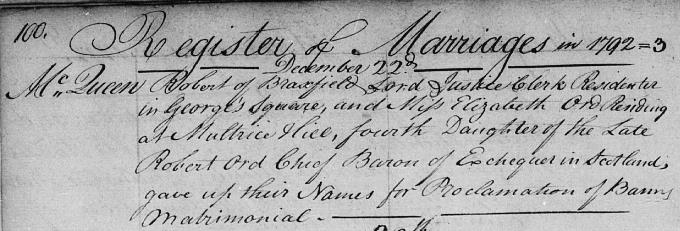Robert Macqueen, Lord Braxfield (1722-1799)
Robert Macqueen, Lord Braxfield (1722-1799)
Judge
Robert Macqueen was called to the Bar in 1744, created Lord Braxfield in 1776 and promoted to the office of Lord Justice Clerk in 1788. He was known as the 'hanging judge'. He sentenced Thomas Muir, one of the founders of the Society of the Friends of the People, to transportation to Australia in 1793; and Deacon Brodie to be hanged on gallows Brodie himself had designed. He has been viewed as the inspiration for Lord Weir in Robert Louis Stevenson's unfinished novel 'Weir of Hermiston' (1896). His contemporary, Henry Cockburn, described him as 'strong built and dark, with rough eyebrows, powerful eyes, threatening lips, and a low growling voice, he was like a formidable blacksmith. His accent and his dialect were exaggerated Scotch; his language, like his thoughts, short, strong, and conclusive.' He also enjoyed a drink and the Jolly Judge pub off Edinburgh's high street is named, ironically, in his memory.
Birth in 1722
Robert McQueen was born on 4 May 1722, the son of John McQueen of Braxfield and Helen Hamilton. The entry in the Old Parish Register (OPR) for Lanark gives the date of baptism as 15 May and includes the names of two witnesses.

Birth and baptism entry for Robert Macqueen (32 KB jpeg)
National Records of Scotland, OPR 648/2
Marriage in 1753
Robert Mcqueen of Braxfield, advocate and Mary Agnew were proclaimed for marriage in June 1753. The entry in the Old Parish Register for Lanark (his parish) records that they were proclaimed for the third time on 22 June 1753.

Proclamation of marriage entry for Robert Macqueen in the OPR for Lanark (28 KB jpeg)
National Records of Scotland, OPR 648/3, page 166
A second entry in the Old Parish Register for Carstairs (her parish) shows the fee for their proclamation was received on 25 June 1753.

Proclamation of marriage entry for Robert Macqueen in the OPR for Carstairs (14 KB jpeg)
National Records of Scotland, OPR 633/3, page 19
Marriage in 1792
Following the death of his first wife Robert McQueen of Braxfield, Lord Justice Clerk, married Elizabeth Ord, fourth daughter of the late Robert Ord, Chief Baron of Exchequer in Scotland. The entry in the Old Parish Register for St Cuthbert's gives his residence as George Square and the date they 'gave up their names for proclamation of banns matrimonial' as 22 December 1792.

Proclamation of marriage entry for Robert Macqueen (44 KB jpeg)
National Records of Scotland, OPR 685-2/17, page 100
Death in 1799
Mr Robert McQueen of Braxfield, Lord Justice Clerk, died on 30 May 1799. The entry in the Old Parish Register for Edinburgh records that he was buried at Lanark on 4 June.

Death and burial entry for Robert Macqueen (25 KB jpeg)
National Records of Scotland, OPR 685-1/98, page 324
Testament of Robert McQueen of Braxfield
National Records of Scotland, CC8/8/131 pp 1374-1382
View transcript (13 KB PDF)
The images of the original document are in jpeg format (approximately 150 KB):
View page 1 of the actual document
View page 2 of the actual document
View page 3 of the actual document
View page 4 of the actual document
View page 5 of the actual document
View page 6 of the actual document
View page 7 of the actual document
View page 8 of the actual document
View page 9 of the actual document